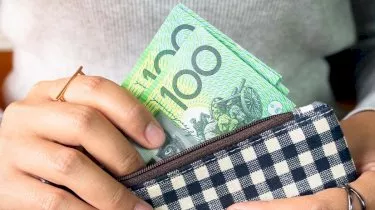Save
2020 saw the fastest increase in bank deposits since the GFC
Bank deposits of Australian households increased by more than 12 per cent last year.
2020 saw the fastest increase in bank deposits since the GFC
Bank deposits of Australian households increased by more than 12 per cent last year.

The total financial assets of Australian households rose by 5.2 per cent in 2020, according to Allianz, driven by a 12.4 per cent increase in bank deposits.
This was the fastest increase in bank deposits recorded since the 19.3 per cent increase during the global financial crisis in 2008. Inflows more than doubled compared to 2019 to a record 18.5 billion euros ($29.2 billion).
The 5.2 per cent rise in gross financial assets was down on the rise of 12.8 per cent recorded in 2019, but in line with the 5.0 per cent average rise recorded in the Oceania region.
Financial assets of Australian households have already risen by about 5.2 per cent in 2021, according to Allianz.

Data released by the Australian Bureau of Statistics last month indicated that household wealth had increased by 5.8 per cent in the June quarter on the back of booming property prices.
Allianz Global Wealth Report ranked Australia as the 13th richest country by net financial assets per capita with 88,740 euros ($140,160). The USA ranked first with 218,470 euros ($345,010).
Globally, financial assets increased by 9.7 per cent in 2020 to surpass 200 trillion euros for the first time. Allianz has estimated overall growth of around 7 per cent for 2021.
Allianz chief economist Ludovic Subran commented that while these headline figures were “very impressive”, they did not necessarily tell the full story.
“Most households did not really save but simply put their money aside,” Mr Subran said.
“All this idle money on bank accounts is a wasted opportunity. Instead, households should invest in their retirement and the green transition, enabling societies to master the paramount challenges we face: climate and demographic change.”
Financial assets grew by 13.9 per cent in emerging markets compared to 10.4 per cent in advanced markets, narrowing the prosperity gap between richer and poorer countries.
However, Allianz suggested that long-term consequences of the pandemic such as “insufficient vaccination and reconfigured supply chains to the digital and green transformation” could disproportionately affect poorer countries.
“Very likely, COVID-19 will continue to hold back economic development in this group of countries for much longer than in the advanced markets,” said Patricia Pelayo Romero, co-author of the Global Wealth Report.
“But the real challenge comes afterwards: These countries will find themselves in a post-pandemic world that will make it increasingly difficult for them to play out their comparative advantages in a proven way, given the lasting changes in technologies, politics and lifestyles.”

Savings account
Protecting your savings from inflation in Australia
Inflation is an economic phenomenon that erodes the purchasing power of money over time, directly impacting the real value of your savings. In Australia, as in many parts of the world, periodic rises ...Read more

Savings account
Maximising your savings effortlessly: The power of automation in Australia
In the fast-paced world we live in, managing finances can often become an overlooked aspect of our daily routines. However, the advent of technology has introduced a seamless solution to this ...Read more

Savings account
Maximising your savings account: What you need to know
Saving money is a fundamental aspect of financial security and wellbeing. Read more

Savings account
Are ‘nudges’ the secret ingredient to financial wellness?
Are better financial habits a simple reminder away? Read more

Savings account
Afterpay launches Money app, bank accounts and retroactive BNPL
Afterpay is upgrading its app-based arsenal. Read more

Savings account
Australians are putting savings goals ahead of holiday plans
While travel restrictions are soon set to ease, Australians are still putting their savings goals first. Read more

Savings account
More than half of Aussie Millennials don’t have a savings plan
Money is remaining a taboo subject for Millennials, which is leading to poor saving habits, a big four bank has revealed. Read more

Savings account
COVID-19 sees Aussies reach record-high wealth
New stats have revealed that Aussies are now richer than ever, having stashed away their cash during a year marred by the COVID-19 pandemic and the resulting economic shutdown. Read more

Savings account
Protecting your savings from inflation in Australia
Inflation is an economic phenomenon that erodes the purchasing power of money over time, directly impacting the real value of your savings. In Australia, as in many parts of the world, periodic rises ...Read more

Savings account
Maximising your savings effortlessly: The power of automation in Australia
In the fast-paced world we live in, managing finances can often become an overlooked aspect of our daily routines. However, the advent of technology has introduced a seamless solution to this ...Read more

Savings account
Maximising your savings account: What you need to know
Saving money is a fundamental aspect of financial security and wellbeing. Read more

Savings account
Are ‘nudges’ the secret ingredient to financial wellness?
Are better financial habits a simple reminder away? Read more

Savings account
Afterpay launches Money app, bank accounts and retroactive BNPL
Afterpay is upgrading its app-based arsenal. Read more

Savings account
Australians are putting savings goals ahead of holiday plans
While travel restrictions are soon set to ease, Australians are still putting their savings goals first. Read more

Savings account
More than half of Aussie Millennials don’t have a savings plan
Money is remaining a taboo subject for Millennials, which is leading to poor saving habits, a big four bank has revealed. Read more

Savings account
COVID-19 sees Aussies reach record-high wealth
New stats have revealed that Aussies are now richer than ever, having stashed away their cash during a year marred by the COVID-19 pandemic and the resulting economic shutdown. Read more













